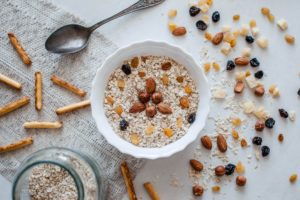A probiotic is good live bacteria and also potentially yeasts. We always have both good and bad bacteria present in our bodies. When you get an infection, there’s more bad than good bacteria, so your system is out of balance. Good bacteria can help your body eliminate the bad and restore balance.
The role of good bacteria is to keep your body in a place of neutrality. The good bacteria in your body help control inflammation and supports your immune function. Certain types of good bacteria also help you digest food, prevent bad bacteria from getting out of control, make vitamins and support the cells lining your gut to make sure bad bacteria can’t enter your blood.
While your body naturally produces good bacteria, some people like to support this with supplements. Several health conditions may benefit from supplementing with probiotics, including constipation, inflammatory bowel disease (IBD), irritable bowel syndrome (IBS), urinary tract infections, and eczema.
The following are tips to keep in mind to help you choose a probiotic.
Table of Contents
1. Look at CFUs
When comparing probiotics, you’ll see them labeled with a number of CFUs. CFUs are colony-forming units, representing the number of bacteria per dose. Most supplements contain between 1 and 10 billion CFUs per dose. Some supplements may have much larger amounts.
For a probiotic supplement to have benefits, large doses are needed.
You want a probiotic that contains billions of organisms, and you can think of the CFUs as a measure of potency. The range of CFUs between products is because of the number of strains.
Along with the number of CFUs, you also want your probiotic to have multiple strains. Diversity is important for gut health. Some brands have a single species, but others have several or more.
2. Refrigerated or Not?
You’ll find some probiotics are refrigerated. Are these better than ones that are self-stable?
Some bacteria strains are sensitive to heat and moisture. For those strains, the heat will kill them instantly, and moisture will prematurely activate them before they can enter your body.
A shelf-stable probiotic may be able to survive an environment that’s room temperature, and it might maintain its level of potency without refrigeration. Most shelf-stable probiotics are good for an average of two years. For example, shelf-stable probiotics may be better for you if you travel a lot from a convenience perspective.
Some probiotic strains require refrigeration, so that doesn’t necessarily mean they’re better or worse than ones that don’t, but just that the strains are different and need different things.
3. Probiotic Strains
Different probiotic strains can have different benefits. Examples include:
- We’re increasingly learning how the gut and brain are connected. It’s called the gut-brain axis. The production of neurotransmitters in the gut shows how strong this link is. Probiotics and gut health can have a significant impact on mental health. For example, if you’re struggling with anxiety, you could try to Lactobacillus rhamnosus strain of bacteria. In animal studies, it was shown to help reduce cortisol and anxiety-like behaviors.
- For someone with IBS, the Lactobacillus acidophilus strain may be helpful.
- People with leaky gut symptoms, such as dermatitis may benefit from strains like L. rhamnosus and L. reuteri.
- Someone with diarrhea could benefit from the L. rhamnosus and Saccharomyces boulardii strains.
- For constipation, Lactobacillus casei and Bifidobacterium lactis may help.
- For the health of the immune system, when choosing probiotics, you might look for a product that contains Lactobacillus paracasei and Lactobacillus acidophilus.
You can also check out ResBiotic for more information.
4. Soil-Based Probiotics
Another option you’ll see available as you compare probiotics is soil-based probiotics. These are bacteria naturally found on the earth, and some people turn to these products if they’ve tried other types of probiotics and not gotten the desired results.
There are more than 100 types of soil-based probiotics. Proponents of soil-based probiotics say they can balance the immune system and gut microbiome and improve digestion.
Some people also use them to help with diarrhea, depression, and allergy symptoms. When You Shouldn’t Take Probiotics
While probiotics as a supplement are generally considered safe, there are some circumstances where they might not be recommended, or you should speak to your healthcare provider before taking them.
People who might be advised not to take a probiotic include those who are very immunocompromised, those with pancreatitis, and those in the ICU. Someone with melaena which is dark blood in the feces, or people with open wounds shouldn’t take probiotics either.
If you have small intestinal bacterial overgrowth (SIBO), you should speak to a health care provider before you take a probiotic because they can make it worse.
6. Probiotic vs. Prebiotic?

Probiotics and prebiotics are two things that can relate to one another, and both can be essential for human health, but they have different roles as well. Prebiotics are substances that come mostly from carbs that humans can’t digest. The beneficial bacteria found in your gut consume these substances, which are fiber.
You can get prebiotics as a supplement but also from foods. This type of fiber is found in vegetables, legumes, and fruits. For example, foods high in prebiotic fiber include dandelion greens, leeks, garlic, oats, berries, and bananas.
Your gut turns prebiotic fiber into a short-chain fatty acid called butyrate. You can’t maintain butyrate production in your colon if you don’t have enough prebiotic fiber intake.
7. Look for High-Quality Manufacturers
Finally, if you take a probiotic in supplement form, you want to make sure that you’re buying one that’s high-quality.
Quality matters for all supplements, especially probiotics. For this reason, it is advisable to do plenty of research beforehand to ensure that your chosen supplement is of satisfactory quality. One good way to do this is to search for Gundry MD Proplant Complete Shake reviews (if that’s your choice, for example) to see what other consumers have to say about the product.
Featured Photo by cottonbro: https://www.pexels.com




